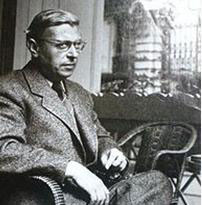Jean-Paul Sartre (1905-1980)
“Man is condemned to be free; because once thrown into the world, he is responsible for everything he does. It is up to you to give life a meaning.” ― Jean-Paul Sartre “It's quite an undertaking to start loving somebody. You have to have energy, generosity, blindness. There is even a moment right at the start where you have to jump across an abyss: if you think about it you don't do it.” ― Nausea “Hell is—other people!” ― No Exit Jean-Paul Sartre was a French existentialist philosopher, novelist, screenwriter and political activist. He was a key figure in 20th-century French philosophy and a vocal proponent of Marxism and socialism. Sartre believed that human beings are “condemned to be free” since there is no Creator who is responsible for our actions. And that freedom requires us to be responsible for everything we do; to lead an authentic life that seeks experience over knowledge. Sartre earned a doctorate in philosophy in Paris at the École Normale Supérieure (ENS) where he developed a life-long friendship, sometime fractious, with fellow French philosopher and political scientist Raymond Aron. In 1964 Sartre was awarded the Nobel Prize in Literature in 1964. He refused to accept it on the grounds that receiving such an award would forever limit his freedom. Sartre’s influential works include La Nausée (1938), Being and Nothingness (1943), The Age of Reason (1944), No Exit (1944, play), Critique of Dialectical Reason (1960), Saint Genet (1952). In ‘La Nausée’ – Sartre’s famous manifesto of existentialism (influenced by the German phenomenological movement) – the protagonist’s (Roquentin) nausea is the restriction of his freedom which is linked to one’s morality. Historical Context During the Second World War Sartre had direct experience of totalitarian terror which included the Nazi occupation of his home country. After the end of the occupation (DEC44) national self-auditing took place on several fronts: the unquestioned foundations of society and morality; the integrity and betrayal in relation to the Occupation; the Resistance and the Vichy Government. New horrors changed the political landscape: German death camps, large-scale strategic bombing of civilian territories, super-efficient ‘city-killer’ atomic bomb. New levels of human capacity for evil and destruction forced philosophical and moral questions beyond mere academic interest. Influence of ‘Being &
Time’ I Create Myself The three-word ‘formula’ – I Create Myself – originated in Sartre’s 1945 lecture "Existentialism Is a Humanism". The late philosophy professor Dr. Arthur Holmes remarks, “’I create myself’ with every act of thought, every experience, every sense perception. You say that sounds like a wild idea. Keep in mind that Sartre is doing phenomenology. He's an existential phenomenologist. Not interested in some 'transcendental self' in order to provide a new foundationalism to rescue science from its relativizing tendencies (Descartes found a foundation of his existence with ideas of reason; Locke found a foundation in experience). Nor is he going be like Heidegger’s - doing a phenomenology of human existence designed as a key to perceiving ‘Dasein’ (translated as ‘existence’) as being itself. Sartre is simply doing a phenomenology of human existence for its own sake in order to gain a clear perception of universal characteristics of human existence. Of 'being'.” For Sartre living in a world of meaningless one must create one’s meaning, one’s value. ‘Existence precede essence’ – I must create my own nature. “I create myself”. Sartre's Dielectric Dr. Holmes opines, “‘A thing for me’ echo’s a Kantian language. The self-consciousness individual is concerned that the world is for me (for-itself). And is blocked all the time by the transience…Sartre’s play ‘No Exit’ is a must read – if you can stand it. It is a dramatic setting of hell – people living with their pasts. Dramatic picture of an individual who wants the other one for self which is negated by the other which is what it is itself (anthesis of en-soi and pour-soi). The ending line in the play is ‘L'enfer, c'est les autres’ or ‘Hell is other people’”.
|
